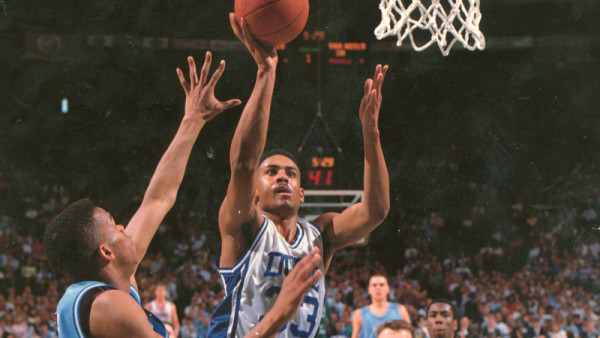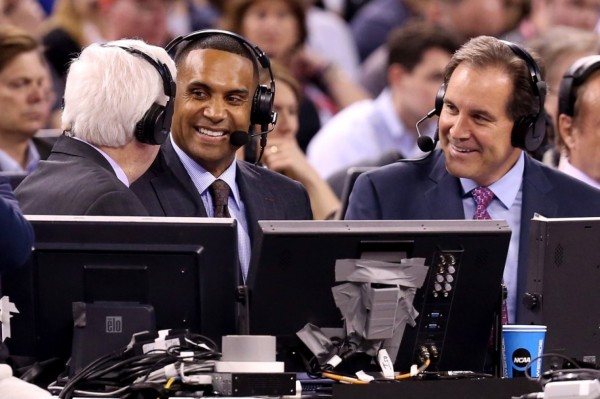The RTC Interview Series: One on One With Grant Hill
Posted by Chris Stone on April 4th, 2016
Tonight’s National Championship game between North Carolina and Villanova will be televised on TBS, the first time in the event’s 78-year existence that the it will air on cable. Ahead of the finale to March Madness, Rush the Court got a chance to speak with Turner Sports analyst Grant Hill, one of the game’s announcing crew along with Jim Nantz, Bill Raftery and Tracy Wolfson. Hill is a two-time NCAA champion, a three-time Final Four participant and an 18-year NBA veteran. We spoke with the basketball icon about what it means to call this event, his experience playing in the Final Four, and the matchup between the Tar Heels and the Wildcats. This interview has been edited for clarity.
Rush the Court: You played in three title games while you were at Duke (1991, 1992, 1994) and now you’re calling the first title game to ever air on TBS. I’m curious what that’s like for you and in a broader sense what it’s like for the network.
Grant Hill: For me, it’s great. I’ve really loved everything about the tournament from the time I was nine years old. I still recall the first Final Four I ever watched, which really sparked a love of the game of basketball and a desire to want to play it back in 1982 when North Carolina beat Georgetown. Then to be fortunate enough play in three Final Fours, three championships, and then now to come full circle and be able to broadcast it, it’s just a tremendous honor and privilege. For us, this is history in the making. The first time a cable network broadcast the NCAA Tournament final. I’ve been exposed to it for the last three years in a couple of different roles, but it’s been great and I’ve enjoyed the combination of both networks’ resources in putting these games on, culminating with this weekend’s Final Four on TBS. It’s exciting and I’m really looking forward to tomorrow night.

Grant Hill played in three Final Fours while at Duke. (Credit: Duke Sports Information)
RTC: We have a Final Four with a lot of upperclassmen playing in it. How did your experience at the Final Four change from when you were a freshman to when you were a senior? What was that transition like?
Hill: I think I played important roles in both Final Fours, from freshman year to senior year. My freshman year, I was a young pup. I was a neophyte. It was my first experience and I really leaned on the leadership of our coach, but also our upperclassmen. They had a responsibility as leaders to lead, for lack of a better word. Then, I had that same role my senior year. Part of that is it’s not just what you do in the game, but it’s what you do prior to the game, preparation during the weekend, during the Final Four. It’s what you do throughout the season. It’s what you do in the offseason prior to that year. Everything is about living up to the championship standard and that responsibility is really on your shoulders as captains, as seniors, as guys who’ve been through it, good and bad. It’s upon you to help create an environment that is conducive to winning. It was something that we lived with every day and you did everything you could. From the time that we assembled as a team in the summer prior to school starting, everything as a leader is about getting yourself ready for this stage and so understanding that, you only get that from experience. You only get that from success and failures and it’s hard as a freshman to be able to know what that’s about. As much as I watched it, as much as I was able to go to a couple Final Fours as a fan in the 80s, not until you’re in it and not until you get a taste of it do you really understand what exactly it’s all about. So, experience, you can’t teach that and we’re seeing that here. We’ve seen it throughout the season. That’s been the theme of college basketball. You look at both teams. They’re senior-led.
RTC: You got a lot of experience your first two years. How did that experience shape your perception of what the NCAA Tournament was like the last two years? Did it make it seem like the tournament was easier than maybe it actually was, or did it give you some perspective on how hard the tournament actually is?
Hill: It lets you know how difficult it is to win. We were fortunate enough to win two [1991 and 1992], but there was so much that went into that accomplishment. I also think my junior year, not winning and losing in the second round, that heartbreak and disappointment was a valuable experience. Having gone through the highest of highs and that feeling of extreme disappointment really gives you some perspective. As I prepared for my senior year, we as seniors had a wealth of experience. I thought that helped us. Now, it didn’t help us enough because we lost in the finals, but we took a team that only played about six or seven guys. We weren’t that deep. We weren’t picked at the beginning of the season to be a finalist, but we just figured it out and trusted each other, played hard and managed to position ourselves to maybe win another championship. That year before, for that group of guys, for us that all we had known was winning, I thought that was really helpful in terms of the next season.
RTC: You mentioned that important role you played on those two teams. You certainly played a role on one of the most important plays in NCAA Tournament history. I am sure you get asked about the Laettner shot often, but how often do you reminisce about that shot?
Hill: I don’t really reminisce too much about that game or that shot. Most of what I recall is the stuff behind the scenes. Today, we as a broadcast crew were at the stadium and had a chance to interact with the players on both teams. You see the relationships, the interactions, the banter between them. It’s that kind of stuff where you share that experience with your teammates. It’s the bus trips, it’s the media obligations, it’s the team dinners, it’s the practical jokes. I think those are what really stands out, what really contributes to your success on the court and is what ultimately you recall. Now, I get to relive certain plays every year in March because they seem to be on TV a lot and that’s great, but I think more about what happened in the locker room after the Kentucky game and some of the comments, the interactions, the celebration. Just how joyful it was. Those are the moments and memories that I think of more so than what transpired on the court.

Hill will call tonight’s national title game along with Bill Raftery and Jim Nantz. (Credit: Streeter Lecka/Getty Images)
RTC: Shifting gears to tonight’s game, if Villanova wins, why will they win?
Hill: They’ll be able to rebound, keep the Tar Heels off the boards. Their defense against Carolina’s interior, they’ll continue with that grit and grind mentality that they bring to every game they play. They’ll execute, they’ll shoot the ball well. I think the main thing, though, is Carolina can win even when they’re not shooting the ball well from the perimeter. They were 0-for-11 and they were still up. So, that tells you that their interior is just so dominant, so they’ve got to keep Carolina off the boards and limit their transition opportunities. If they can do that and continue with their stellar play on the offensive end, then they can very easily win.
RTC: You mentioned their defense. One of the things that Villanova does well is it plays multiple different defenses. From your perspective as a player, how does that affect what you’re doing on offense?
Hill: They switch a lot and I think sometimes teams can get caught up in trying to expose the mismatch. In doing that, at times, it can take you out of your rhythm. All offenses are about execution and rhythm and timing and you get a small on a big and now you’re spending time trying to expose that, it can make life difficult. Of course, Villanova’s defense is like a hybrid. They switch, they help. Sometimes it looks like they’re in man, but the help is kind of disguised as a zone. Sometimes it’s hard to read, so I think offensively you really just have to play. You have to trust your offense, move the ball and not try to get into a one-on-one style of play because that plays right into Villanova’s hands.
RTC: Now, we’ve got to talk about your rival North Carolina. What does North Carolina need to do to beat Villanova?
Hill: I think North Carolina has to obviously continue with their play inside. Brice Johnson’s going to have to play well. They’re going to have to dominate on the boards. Defensively, they’re going to have to be very disciplined. Each possession on the defensive end will be a long possession. Villanova is adept at playing at their pace, moving the ball, taking advantage of any weakness, so Carolina’s just going to have to be solid on defense and make Villanova take and make tough shots. Then, they’re going to have to get out in transition. They’ve got to dominate fast break points and points in the paint. It’s got to be at least 15 points in transition and 20 plus points in the paint. Maybe 30 points in the paint and at least +8, +10 on the glass. If they can do that, then they’re talented enough to where they can win it.
RTC: One last question, I saw in a previous interview that you don’t personally have an interest in taking the Duke job when Coach K retires, but what type of person would it take to follow Coach K in Durham?
Hill: There’s a standard and expectation of Duke basketball. I think the powers that be will want to continue with the legacy that Coach K’s established. I would envision that it would be somebody that understands what that legacy’s all about. They’ve either coached or played, or done both under Coach K. Look, those are big shoes to fill and there’s no guarantees that anyone will be able to come in and continue with that kind of dominance. It’s going to take somebody who’s also not intimidated by following someone who has done so well. It’s going to take a special type of leader, a special type of personality, a special type of coach.









































